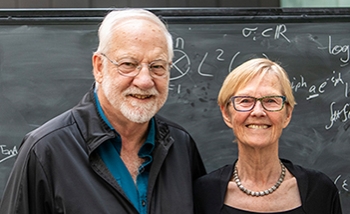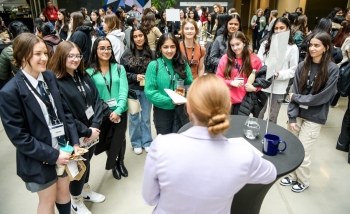Travelling innovation tour delivers – and discovers – inspiration across Canada
Sarah Hart knows the price of isolation. For years, her family has regularly made the long trip to Edmonton so Hart’s sister, who has cystic fibrosis, can get the advanced medical treatment she needs.
With such personal exposure to the importance of modern medical technology, it’s no wonder Hart wants to pursue biomedical engineering after she graduates high school this year. What might surprise people is that she wants to do it at home, in Yellowknife.
“My goal is to become a biomedical engineer, and then take those MRI machines and find a way to make them smaller or more portable, so our government can afford them,” she said. “The people here deserve to get that treatment at home.”
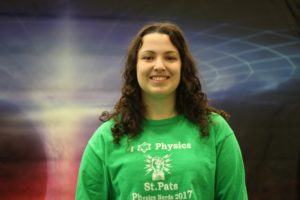
École St. Patrick Grade 12 student Sarah Hart[/caption]
Hart has big ambitions, but they’re not out of place up here among the frozen lakes and fluttering ptarmigans. Spend any time exploring Canada, and you’ll quickly realize that innovation is a survival skill in the Great White North. So when the Power of Ideas tour mapped out its destinations for the country’s sesquicentennial year, there was no doubt it would venture well above the 49th parallel.
The Inuit created the world’s first sunglasses to prevent snow blindness. Block-mounted heaters today ensure your car engine starts at 40-below. The asphalt ends, so an ice road begins. You see a problem, and you find a way fix it, whether it’s keeping your toes warm or solving complex issues of medical access. Innovation isn’t a buzzword; it’s an essential part of the human character.
The trouble is, most innovation stories focus on the end result – the disruptive new technology, the social breakthrough, the billion-dollar success – when the driving force of innovation is the process that leads to that point. Innovation isn’t a destination: it’s a process, one that can be learned and honed, and which anyone can be a part of.
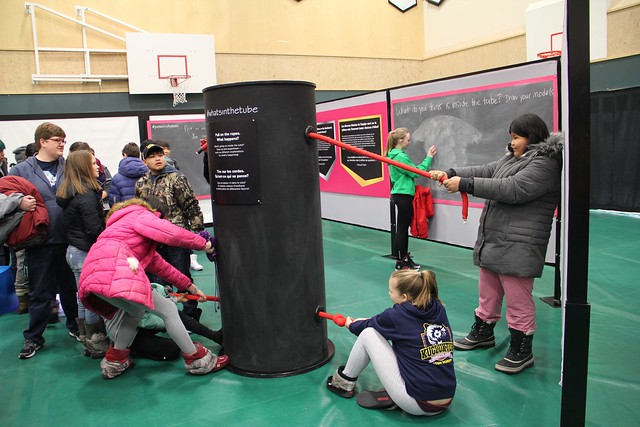
The Power of Ideas travelling exhibit is sharing this message with thousands of students through 2017 as part of Innovation150. The tour is visiting 60 communities, most of them in under-served regional and remote areas. Alongside it, educational outreach organization Actua is running a Maker Mobile that enables students to grapple with challenges in science, technology, engineering, and math.
The goal is to inspire Canada’s next generation of hackers, makers, doers, and thinkers – no matter where they live.
As the students at Yellowknife’s École St. Patrick High School will tell you, it’s not just kids in big urban centres who hold the potential to change the future. “We have smart kids here; we have some top marks,” Hart said. “We deserve the recognition, too.”
Her classmate Sebastian Toner said the Power of Ideas presentation prompted him to rethink some of his own ideas, with an eye to creating innovations in the future. “It’s pretty cool to have this come here, because usually we have to go places to see stuff. To have this cool tour come to Yellowknife is pretty sweet. It’s a good opportunity for everyone here.”
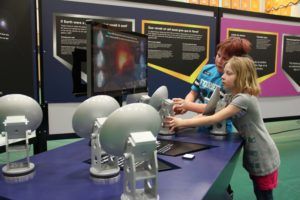
Abbey and Cobain Roos train their telescopes on a distant galaxy in the EHT demonstration.[/caption]
The tour focuses on middle- and high-school students, but some stops, such as the visit to Yellowknife in early March, also include a public event open to all ages.
École St. Patrick physics teacher and science department head Thana Rahim hopes the year-long project continues to resonate throughout rural and remote Canada long after the sesquicentennial.
“I’m hoping we will have more physicists and scientists in Canada [thanks to Innovation150],” Rahim said. “This is inspiring. You don’t have to be the A-type student to be innovative. If you have something in your mind, just one idea, if you go for it, imagine it, and believe you can do it – you can do it. I’m so happy my kids get to experience this.”
It’s not just the students who are gaining a deeper insight into innovation in Canada. Four presenters – whose backgrounds range from physics to marine biology to neuroscience – are travelling across the country, delivering the Power of Ideas talk and leading demonstrations in the science exhibit.
The experience has prompted them to redefine their own understanding of what innovation means to them, and to Canada.
For presenter Cat Lau, whose background is in psychology and neuroscience, innovation is about making a positive difference in the world. “Science is definitely an avenue, a way you can actually go about and make a difference,” she said. “Seeing people being so engaged with science gives me so much hope.”
The tour is quickly making it clear to her that the impact of science can reach well beyond the field itself. Students have approached her after the presentation, inspired to use ideas from science in their novels or short stories. “It’s interesting how science can become a muse for people who might not be interested in it. They could be our next innovators. Who knows?”
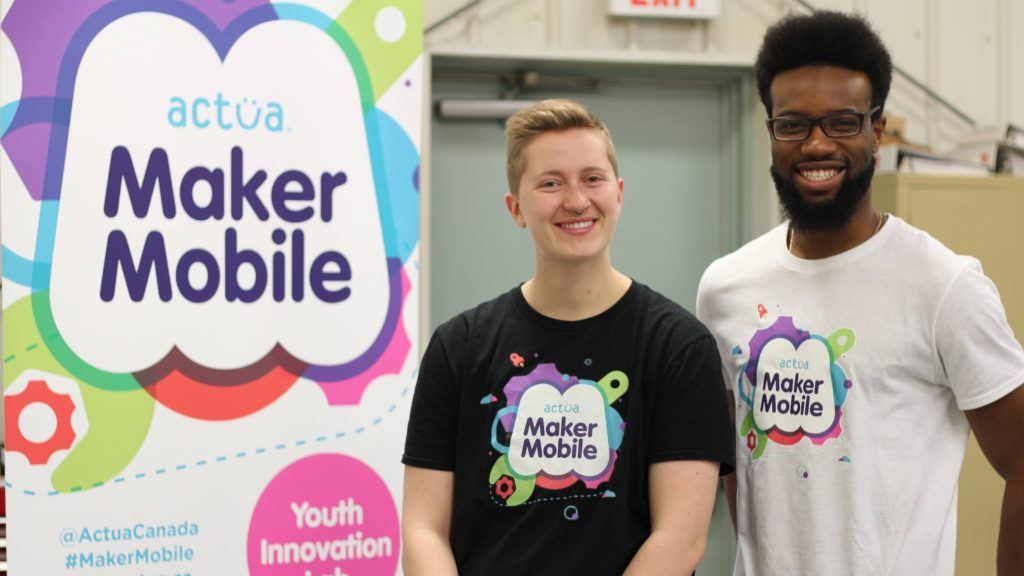
Actua Maker Mobile facilitators Lauren Sortome and Kevin Semple.[/caption]
As Actua facilitator Lauren Sortome, who at 22 is not much older than the students participating in the Maker Mobile projects, pointed out, the cumulative picture is incredibly bright.
“Being on this tour as part of Innovation150 makes me just realize all the potential in all these youth, all the ideas that they have, and how willing they are to put them to use when given the opportunity. We’ve seen some amazing innovations," Sortome said.
Bishal Yadav didn’t need any more incentive to study science – he hopes to pursue aerospace engineering or astronomy after he graduates this year – but having the Power of Ideas visit his hometown made his dream feel a bit closer.
“Usually there’s not much science or exhibits in Yellowknife,” he said. “Innovation and science go hand in hand. That’s how we keep moving forward with technology, and that’s how the world keeps on advancing.”
Leading that charge will be the Canadian teens and tweens who will get their chance this year to play with the Event Horizon Telescope and Large Hadron Collider demonstrations in the Power of Ideas exhibit, to formulate string theories with Perimeter Institute’s mystery tube, to learn about electrons as they play with the plasma ball, and to make their own weather stations in the Maker Mobile.
“We all have the same basic questions,” said Hart, the bio-med hopeful. “What is out there? What are we living in? Everyone has the same questions, no matter what language. [With science] we get past those barriers, to find out the answers together.”
Further exploration
About PI
Perimeter Institute is the world’s largest research hub devoted to theoretical physics. The independent Institute was founded in 1999 to foster breakthroughs in the fundamental understanding of our universe, from the smallest particles to the entire cosmos. Research at Perimeter is motivated by the understanding that fundamental science advances human knowledge and catalyzes innovation, and that today’s theoretical physics is tomorrow’s technology. Located in the Region of Waterloo, the not-for-profit Institute is a unique public-private endeavour, including the Governments of Ontario and Canada, that enables cutting-edge research, trains the next generation of scientific pioneers, and shares the power of physics through award-winning educational outreach and public engagement.
